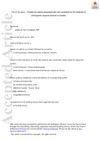 6 citations,
February 2020 in “Journal of The European Academy of Dermatology and Venereology”
6 citations,
February 2020 in “Journal of The European Academy of Dermatology and Venereology” No benefits found using platelet-rich plasma in hair transplants for male hair loss.
 November 2009 in “Cambridge University Press eBooks”
November 2009 in “Cambridge University Press eBooks” Minoxidil and finasteride combined can effectively treat hair loss.
 101 citations,
January 2012 in “Annals of Dermatology”
101 citations,
January 2012 in “Annals of Dermatology” Men with hair loss experience lower quality of life, worsened by factors like age, severity, and treatment history.
 34 citations,
March 2001 in “Cleveland Clinic Journal of Medicine”
34 citations,
March 2001 in “Cleveland Clinic Journal of Medicine” Manage hair shedding by identifying triggers, possibly using supplements or medications, and tracking with a health calendar.
 7 citations,
May 2016 in “SpringerPlus”
7 citations,
May 2016 in “SpringerPlus” Some breast cancer patients on hormone therapy experience hair loss, and treatments like certain topical inhibitors and supplements may help without harming their cancer prognosis.
February 2025 in “Journal of Cosmetic Dermatology” Patch testing is crucial to reduce allergic reactions in hair loss treatments.

Hair loss can cause significant social and emotional issues, especially for women and young men.
 3 citations,
March 2014 in “Veterinary dermatology”
3 citations,
March 2014 in “Veterinary dermatology” Norwegian puffin dogs have a unique type of hair loss that often doesn't get better on its own and responds well to ciclosporin treatment.
 9 citations,
April 1986 in “Postgraduate Medicine”
9 citations,
April 1986 in “Postgraduate Medicine” Hair loss has many causes and treatments, and losing some hair daily is normal; proper diagnosis is key, and minoxidil can help treat it.
 1 citations,
July 2023 in “Journal of Clinical Medicine”
1 citations,
July 2023 in “Journal of Clinical Medicine” Different causes of beard hair loss have various treatments, including medications, lifestyle changes, and procedures to stimulate hair growth.
24 citations,
January 2012 in “Journal of natural science, biology and medicine” Tinea capitis is common among Kolkata school children, especially boys, and hygiene doesn't greatly impact infection rates.

Maintaining enough zinc may help prevent and manage hair loss.
14 citations,
January 2016 in “International Journal of Trichology” Many women with hair loss also have thyroid issues, high blood pressure, and low Vitamin D.
 December 2020 in “The Journal of Family Practice”
December 2020 in “The Journal of Family Practice” The boy's itchy scalp and hair loss were likely due to head lice treatment.
 32 citations,
June 2017 in “Journal of infection/The Journal of infection”
32 citations,
June 2017 in “Journal of infection/The Journal of infection” The document concludes that terbinafine is effective for treating scalp fungal infections in children and recommends not excluding them from school during treatment, while also highlighting the need for updated treatment guidelines due to changing infection patterns.
 1 citations,
October 2016 in “Iranian journal of psychiatry and behavioral sciences”
1 citations,
October 2016 in “Iranian journal of psychiatry and behavioral sciences” Sertraline, an antidepressant, may rarely cause hair loss.
 17 citations,
January 1995 in “The American Journal of Medicine”
17 citations,
January 1995 in “The American Journal of Medicine” The document concludes that proper diagnosis and tailored long-term treatment can effectively manage androgenic disorders in women, improving patient care outcomes.
 January 2021 in “Journal of cosmetology & trichology”
January 2021 in “Journal of cosmetology & trichology” The treatment improved hair growth and thickness in patients with hair loss, even 10 months after therapy without additional products.
 May 2022 in “Journal of the Egyptian Women's Dermatologic Society (Print)”
May 2022 in “Journal of the Egyptian Women's Dermatologic Society (Print)” Women's hair loss can be due to hormonal changes and various conditions, with treatments focusing on stopping progression and managing symptoms.

Hair loss should be medically treated, as non-medical treatments are ineffective and hair loss can indicate serious health issues.
 56 citations,
August 2019 in “Clinical, Cosmetic and Investigational Dermatology”
56 citations,
August 2019 in “Clinical, Cosmetic and Investigational Dermatology” The document concludes that Telogen Effluvium is a hair loss disorder that can be assessed with the modified wash test and may be treated with clobetasol foam, with patient management being important.
 147 citations,
April 1994 in “Drug Safety”
147 citations,
April 1994 in “Drug Safety” Some drugs can cause hair loss or increase hair growth, but these effects are usually reversible when the drug is stopped.
 6 citations,
October 2005 in “Indian Journal of Dermatology”
6 citations,
October 2005 in “Indian Journal of Dermatology” The document discusses male and female pattern hair loss, its diagnosis methods, FDA-approved treatments like finasteride and minoxidil, their side effects, and the role of lifestyle changes.
 36 citations,
January 2006 in “Veterinary Dermatology”
36 citations,
January 2006 in “Veterinary Dermatology” Cyclosporin effectively and safely treated skin diseases in three pets with no side effects.
 1 citations,
January 2006 in “Elsevier eBooks”
1 citations,
January 2006 in “Elsevier eBooks” Cats lose fur due to various reasons, including allergies, infections, genetics, hormones, diet, cancer, stress, and some conditions are treatable while others are not.

The document concludes that most hair loss treatments don't work, balding isn't caused by dandruff, and hair loss may indicate serious health issues that require medical attention.
 12 citations,
May 1989 in “Postgraduate Medicine”
12 citations,
May 1989 in “Postgraduate Medicine” The document concludes that hair loss is common and can be treated with medications like minoxidil or surgical options, and it significantly affects people's psychological well-being.
 42 citations,
July 2012 in “PLOS ONE”
42 citations,
July 2012 in “PLOS ONE” Estrogen can temporarily slow down hair growth but this can be reversed.
 October 1961 in “Archives of Dermatology”
October 1961 in “Archives of Dermatology” Reassurance is important for postpartum hair shedding as it likely won't cause complete baldness.
 January 2018 in “Springer eBooks”
January 2018 in “Springer eBooks” Athletes need effective management of skin disorders for their performance and well-being.



























